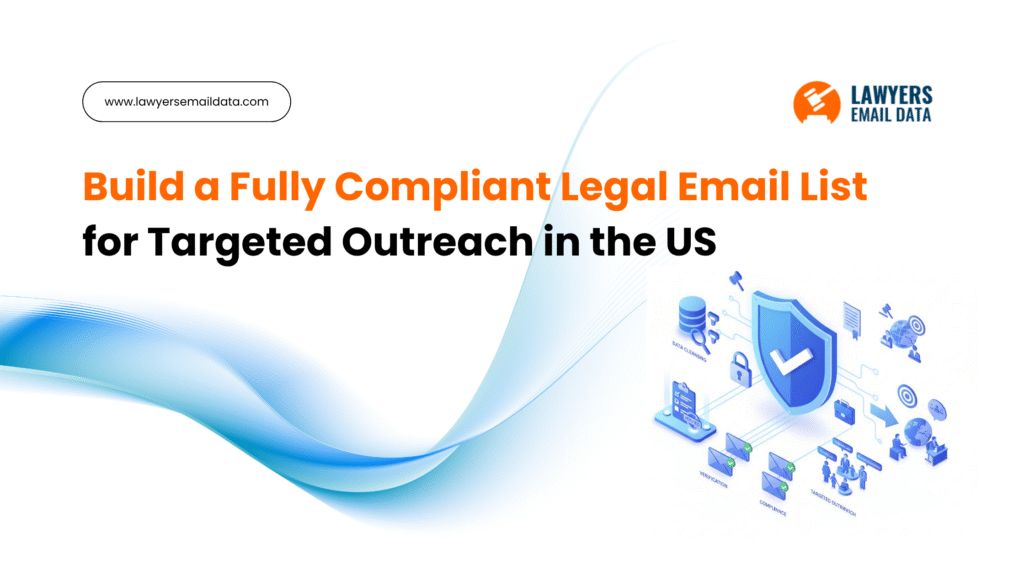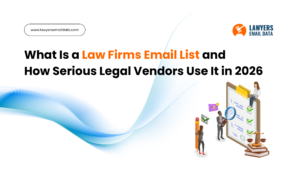In the highly regulated world of legal marketing, building a compliant legal email list for targeted outreach is essential for connecting with the right decision-makers. But creating such a list isn’t as simple as collecting a batch of emails. It requires accuracy, attention to detail, and adherence to legal and privacy regulations. This comprehensive guide will walk you through the process of building a fully compliant legal email list, ensuring that your outreach efforts are successful, efficient, and in full compliance with US laws.
Why Compliant Legal Email Lists Matter
For law firms and legal service providers, outreach via email can be one of the most effective ways to engage potential clients and partners. However, the legal industry operates within a strict regulatory framework, with data protection laws like CAN-SPAM and CCPA (and GDPR for international contacts) that govern how email data is collected, stored, and used. Failing to comply with these regulations can lead to penalties, legal trouble, and damaged brand reputation.

By building a compliant legal email list, you ensure that your outreach is:
- Legal and Ethical: Avoid fines and legal issues by adhering to email marketing regulations.
- Effective: Reach the right individuals at the right time with personalized and targeted outreach.
- Trusted: Establish credibility by sending messages that recipients want to engage with, respecting their data privacy.
What is a Compliant Legal Email List?
A compliant legal email list consists of verified and accurate contact information for legal professionals, law firms, and decision-makers within the legal industry. These lists comply with privacy regulations such as CAN-SPAM and GDPR, ensuring that you only send emails to individuals who have opted in and are legally permitted to receive marketing messages.
A compliant legal email list also includes segmentation-categorizing contacts based on factors like practice area, firm size, job role, and location-so that your outreach is targeted and relevant. This level of personalization ensures higher engagement rates, better conversion opportunities, and more successful marketing campaigns.
How to Build a Fully Compliant Legal Email List
Building a compliant legal email list involves several crucial steps to ensure data accuracy, compliance, and effective outreach.
1. Enrich Your Existing Database
To build a compliant and high-quality email list, the process involves a combination of careful data enrichment, verification, and ongoing maintenance. It’s important to recognize that this is a time-consuming process, requiring constant attention and precision at every step. From initial data cleansing to regular audits, each stage demands detailed work to ensure accuracy and compliance. While the effort may seem extensive, this careful approach is necessary to maintain a list that is both effective for your marketing campaigns and compliant with laws, and regular updates and checks are key to sustaining the quality of your email list over time.

Data Cleansing
Why it’s important: Clean data is foundational to any successful email campaign. Without accurate, complete, and correctly formatted information, your marketing efforts will be inefficient and potentially damaging to your brand reputation.
- Remove duplicates: Start by identifying and eliminating duplicate records. This ensures you’re not sending multiple emails to the same contact, which could lead to frustration or unsubscribes.
- Fix incomplete records: Missing job titles, email addresses, or names can make your list ineffective. Make sure all essential fields are filled in.
- Standardize formatting: Consistency in how information is formatted (e.g., addresses, phone numbers) ensures smooth integration with other systems and improves campaign performance.
Data Verification
Why it’s important: Verifying your contact data is critical to ensuring deliverability and maintaining a strong sender reputation. Invalid or outdated contacts can hurt your open rates and increase bounce rates.
- Email validation: Use specialized tools to verify the validity of email addresses before adding them to your list. This step reduces bounce rates and improves the quality of your list.
- Cross-check contact details: Ensure your data is cross-referenced against trusted, authoritative sources like corporate directories or social media. This ensures the information is current and valid.
Data Segmentation
Why it’s important: Segmenting your data allows you to target the right people with the right message, which increases the likelihood of engagement and conversions.
- Categorize contacts: Organize your contacts by industry, role, geographic location, or other relevant criteria. This ensures that your email campaigns are highly targeted and personalized.
- Behavioral segmentation: Go a step further and segment based on past actions, purchases, or interactions. This allows for tailored messaging that speaks directly to the interests and needs of your contacts.
Compliance Checks
Why it’s important: Compliance with laws like CAN-SPAM, GDPR, and other regulations is mandatory when building a legal and compliant email list. Non-compliance can result in fines, penalties, and damage to your reputation.
- Consent validation: Ensure every contact on your list has explicitly opted in to receive emails. This is crucial for maintaining compliance with opt-in laws.
- Legal compliance: Make sure your list adheres to industry-specific regulations, especially when dealing with sensitive sectors (e.g., healthcare, finance). This step ensures that your email marketing practices are legally sound.
Ongoing Data Maintenance
Why it’s important: Maintaining the integrity of your email list requires continuous monitoring and updates to keep it fresh, relevant, and accurate.
- Regular audits: Conduct periodic audits to identify and remove outdated, incorrect, or inactive contacts. This keeps your list lean and effective.
- Monitor feedback: Analyze the performance of your email campaigns (e.g., open rates, click-through rates, bounce rates) to refine your list and adjust strategies accordingly. This ensures that your email list continues to meet the needs of your audience and remains compliant.
2. Implement Email List Segmentation

Segmentation allows you to categorize your email lists based on specific criteria, which is crucial for targeted outreach. Here are some ways to segment your legal email list:
- Practice Areas: Personal injury, corporate law, family law, etc.
- Job Roles: Partners, associates, in-house counsels, paralegals.
- Firm Size: Solo practitioners, small law firms, large corporate firms.
- Geographical Location: Target specific states, cities, or regions.
Effective segmentation ensures that your email campaigns are relevant and personalized, leading to higher engagement rates.
3. Use Email Verification Tools
While you can purchase a verified legal email list, it’s essential to continuously verify and update your lists. Email addresses change frequently, so using email verification tools helps to keep your list clean and free of inactive contacts or invalid emails. Verification helps:
- Minimize bounce rates and improve deliverability.
- Enhance sender reputation by ensuring emails reach real recipients.
- Increase engagement by targeting active and relevant leads.
4. Ensure Compliance with Privacy Laws
Compliance with laws such as CAN-SPAM, GDPR, and CCPA is vital for law firms and legal professionals when sending marketing emails. These regulations dictate how emails can be sent, how data should be handled, and how recipients can opt out of communications.
To remain compliant:
- Always include an opt-out or unsubscribe option in your emails.
- Obtain explicit consent from individuals before adding them to your email list.
- Follow GDPR and CCPA guidelines if your outreach involves international clients.
- Maintain a transparent privacy policy that explains how customer data is collected and used.
Importance of Accurate Data in Legal Email Marketing
Accurate data is the cornerstone of any successful email marketing campaign. For law firms, using verified legal email lists ensures that the outreach reaches the right decision-makers—such as corporate attorneys, general counsels, and in-house legal teams. This level of precision enables law firms to improve their lead generation and client acquisition efforts, driving better results with less effort.
- Improved Response Rates: By using accurate and verified data, law firms can improve their email open rates and response rates, as the emails are relevant to the recipients’ roles and needs.
- Reduced Bounce Rates: Accurate data ensures that emails are delivered successfully, which reduces bounce rates and helps protect your sender reputation.
- Higher Engagement: Personalization and relevance lead to higher engagement rates, ensuring that your outreach doesn’t get ignored or marked as spam.
Best Practices for Building a Legal Email List
To maintain a compliant legal email list and run successful campaigns, follow these best practices:
1. Personalize Your Emails
Personalized emails outperform generic ones. Use segmented legal email lists to tailor messages that speak directly to the needs of specific decision-makers. Personalized outreach demonstrates that you understand the recipient’s business and legal challenges.
2. Use Automation for Consistency
Email marketing automation platforms can help law firms maintain a consistent communication schedule. Automating tasks such as follow-ups, lead nurturing, and onboarding ensures that no leads are overlooked and that the email campaigns are always timely.
3. Monitor and Optimize Your Campaigns
Regularly track the performance of your email campaigns. Look at metrics like open rates, click-through rates, and conversion rates to understand what’s working and what needs improvement. Use this data to optimize your future campaigns.
How Lawyers Email Data Can Help
At Lawyers Email Data, we specialize in providing verified, segmented legal email lists that help law firms and legal professionals reach the right people. Our email lists are regularly updated, ensuring compliance with all US regulations, including CAN-SPAM and GDPR. By using our services, law firms can streamline their lead generation, client acquisition, and email marketing efforts.
We offer:
- High-quality, verified email data for legal professionals.
- Targeted, customizable lists based on practice area, firm size, location, and more.
- Real-time updates to ensure the accuracy of your contacts.
Conclusion
Building a compliant legal email list is crucial for effective legal marketing. By focusing on verified data, segmentation, and compliance, law firms can ensure their email outreach is both efficient and legally sound. With the right email list provider and strategies in place, law firms can improve their lead generation, enhance engagement, and ensure legal compliance while protecting their brand reputation.
Ready to build a compliant legal email list that drives results? Contact us for a free consultation and get access to our verified, segmented legal email lists today.
Frequently Asked Questions (FAQ)
Ensure your email list provider follows CAN-SPAM, GDPR, and CCPA compliance, and always include an opt-out option in your emails.
Segmentation allows you to target specific decision-makers based on practice areas, firm size, and location, leading to more personalized and relevant messaging.
It’s recommended to update your email list at least quarterly to ensure accuracy and engagement, especially in the legal industry where contacts often change.
Using a verified list ensures higher engagement, better deliverability, and reduces the risk of bounce rates or spam complaints.
Yes! With segmentation, you can tailor messages to specific groups, increasing engagement and relevance while improving your conversion rates, leading to a higher ROI.



